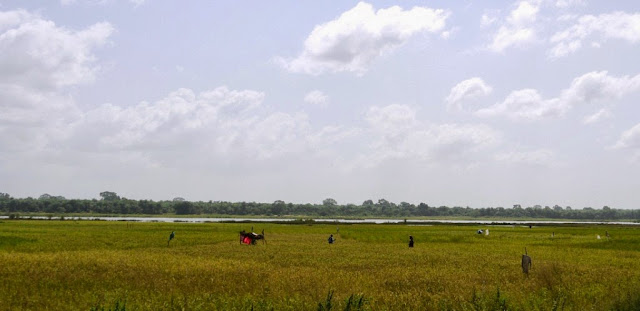 We spend two nights in Accra, capital of Ghana. Pleasant though it may be, with monuments and large boulevards, it still remains a big city and buzzing in a way that we sometimes find exhausting.
We spend two nights in Accra, capital of Ghana. Pleasant though it may be, with monuments and large boulevards, it still remains a big city and buzzing in a way that we sometimes find exhausting. The name "Accra" apparently stems from the Akan word nkran, a reference to the numerous manner in which the natives of Accra kept re-appearing like army ants during a war with the Ashantis. Now however, it is hard not to think of another meaning.
So we did what we usually do in the big cities, send the usual postcards to the kids in the family, enjoyed the varied cuisine, and even caught our first big screen movie (Thor: The Dark World) at the cinema in the Accra Mall (a source of great pride apparently as it is considered the only one in this region).
 |
| Post office |
 And we also attempted a night out, again. Let me explain. West Africa is of course famous for its music and night life. We haven't really been able to benefit from this.
And we also attempted a night out, again. Let me explain. West Africa is of course famous for its music and night life. We haven't really been able to benefit from this.Problems with calendars, being on the road a lot and not necessarily too inclined to spend a lot of time in the capitals, we haven't had any crazy nights out yet, which I admit is a bit of a source of frustration for me. And, well , let's be honest, we're not 21 anymore either... Sometimes it is just hard to drag ourselves to a club, spend ridiculous amounts of money on cover fees and drinks, witness a lot of cheesy and/or sleazy behavior and not be able to talk much because of the pounding music... You can tell from my description why we sometimes lack the courage. Anyway, in Accra, we decided to give it another shot.
So we started out at the French Institute of Accra, usually a good spot for live music and an artsy crowd. Here we first visited an exhibition of... coffins. Yep, fantasy or theme-coffins, for families that wish to bury their loved ones in for instance a fish shaped coffin, if he was a fisherman, or a hammer for a carpenter. (for more info, Abebuu Adekai).
+small.JPG) |
| My personal favorite was of course the cinema related coffin. |
Anyway, we got called over by an elderly Italian guy, sitting with a very young and beautiful Ghanaian girl and his bored looking driver, Alex. He insisted that we join him and that we were to be his guests for the evening. Turns out he was a very wealthy (and from our internet searches afterwards, probably quite corrupt) business man who, without much ado, admitted to"buying his company". The 18 year old girl in his company, bright and eager, also affirmed this openly and even made fun of him. In a way it was sad to see these dynamics, which we've seen so often during our trip (old white guy-young gorgeous local girl). It was interesting however that both acknowledged it freely and talked about it openly, so the evening wasn't a drag, but actually had some interesting moments. Despite their invitation, we however didn't feel like lingering and so, again, winded up back at the hostel and in bed quite early...















.jpg)
.jpg)
.jpg)
.jpg)





+detail.jpg)












.jpg)
.jpg)
.jpg)
.jpg)
.jpg)
.jpg)
.jpg)

.jpg)
.jpg)
.jpg)
.jpg)